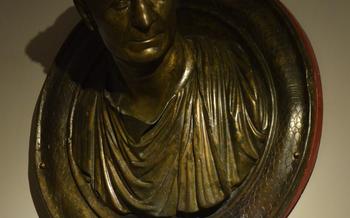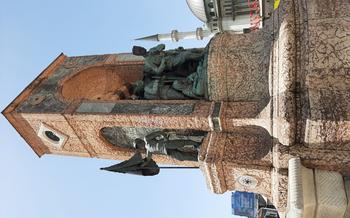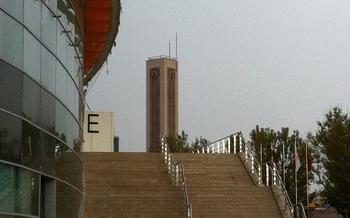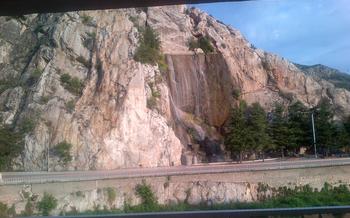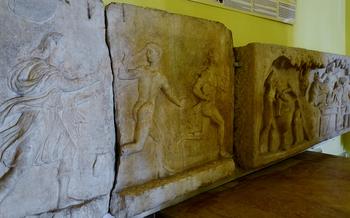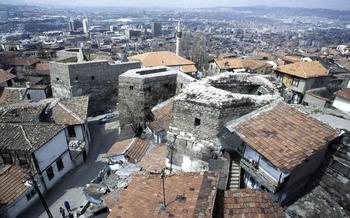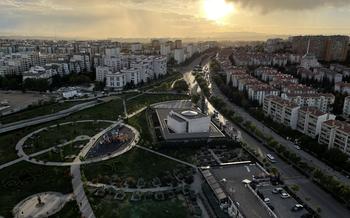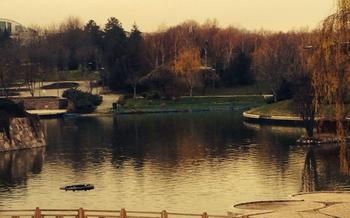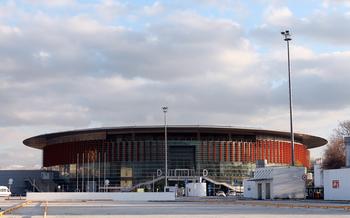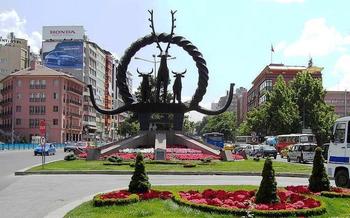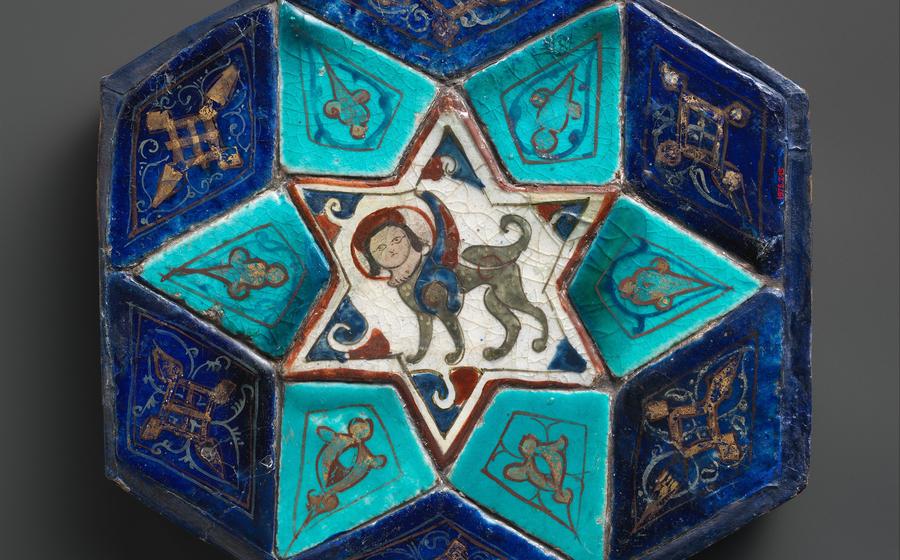
Ankara University Museum of History
- Historical Significance: Unveiling Ankara's Transformation
- Museum Exhibits
- Architecture and Design
- Curatorial Expertise
- Research and Academics
- Educational Programs: Nurturing a Love for History
- Temporary Exhibitions: Unveiling Diverse Perspectives
- Visitor Experience
- Community Engagement: Fostering Cultural Connections
- Conservation and Preservation
- Digital Initiatives:
- Events and Programs
- Museum Shop
- Accessibility and Inclusivity
- Insider Tip:
Historical Significance: Unveiling Ankara's Transformation
Ankara University Museum of History stands as a testament to the rich and transformative journey of Ankara, Turkey's capital city. Established in 1937, the museum holds within its walls a treasure trove of artifacts, documents, and exhibits that narrate the compelling story of Ankara's evolution from a provincial town to a bustling metropolis.
The founding principles of the university, deeply rooted in the visionaries of the early 20th century, were to establish a center of academic excellence that would foster intellectual growth and contribute to Turkey's modernization. The museum, an integral part of this vision, serves as a repository of the university's history and the broader historical narrative of Ankara.
Over the decades, the museum's collection has been enriched by historical events that have shaped Ankara's destiny. From the remnants of ancient civilizations that once thrived in the region to the relics of the Ottoman era, the museum offers a tangible connection to the city's past. Artifacts unearthed during archaeological excavations, meticulously preserved documents, and poignant personal belongings of historical figures provide visitors with a profound insight into the forces that have molded Ankara into the vibrant capital it is today.
Museum Exhibits
The Ankara University Museum of History boasts a diverse collection of artifacts, manuscripts, and documents that offer a captivating glimpse into Turkey's rich past. Among the highlights are ancient coins, pottery, and jewelry that showcase the region's cultural heritage from prehistoric times to the present day. Visitors can also explore exhibits on the history of Ankara, from its humble origins as a small Anatolian village to its transformation into a vibrant capital city. The museum's collection includes maps, photographs, and personal belongings that provide insights into the lives of Ankara's residents throughout the ages.
One of the most fascinating exhibits is a collection of documents related to the Turkish War of Independence. These include letters, telegrams, and military orders that offer a firsthand account of the struggle for independence from the Ottoman Empire. Visitors can also view personal items belonging to Mustafa Kemal Atatürk, the founder of the Turkish Republic, including his uniform, sword, and writing desk.
Another highlight of the museum is its collection of Islamic art and artifacts. This includes intricate calligraphy, ceramics, and textiles that demonstrate the rich artistic traditions of the Islamic world. Visitors can also learn about the history of Islam in Turkey and its influence on the country's culture and society.
Through its diverse exhibits, the Ankara University Museum of History provides visitors with a comprehensive understanding of Turkey's past, from ancient civilizations to the modern era.
Architecture and Design
The Ankara University Museum of History is housed in a magnificent building that reflects the architectural heritage of Ankara. Constructed in the early 20th century, the building showcases a blend of Ottoman and modern architectural styles. The exterior façade features intricate stone carvings, arched windows, and a grand entrance that invites visitors into the museum's captivating world.
Inside, the museum's spacious galleries and hallways are adorned with high ceilings, polished marble floors, and elegant chandeliers. The layout of the exhibits is thoughtfully designed, allowing visitors to navigate through history chronologically and thematically. Each gallery is dedicated to a specific era or aspect of Ankara's past, creating a cohesive and immersive experience for visitors.
One of the most striking features of the museum is its central atrium, which features a grand staircase that leads to the upper floors. The atrium is bathed in natural light from a large skylight, creating a sense of awe and grandeur. The staircase is adorned with intricate wrought-iron railings and decorative tiles, adding to the building's aesthetic appeal.
Throughout the museum, visitors can find hidden architectural gems, such as secret passageways, concealed alcoves, and ornate fireplaces. These hidden treasures add an element of intrigue and discovery to the museum experience, encouraging visitors to explore every nook and cranny of the building.
Curatorial Expertise
The Ankara University Museum of History boasts a team of dedicated curators who play a pivotal role in preserving and showcasing the museum's rich collection. These experts possess extensive knowledge of Turkish history, culture, and art, and their curatorial approach reflects a deep understanding of the museum's mission and vision.
The curators employ a rigorous methodology in organizing and presenting the exhibits. They meticulously research and select artifacts, documents, and manuscripts that provide a comprehensive narrative of Turkey's past. Their expertise ensures that the exhibits are not only visually appealing but also historically accurate and informative.
One of the curators, Dr. Aylin Öztürk, has dedicated her career to studying the history of Ankara. Her research on the city's transformation from a provincial town to a modern capital has been instrumental in shaping the museum's exhibits on urban development. Dr. Öztürk's passion for her work is evident in the thought-provoking displays that bring Ankara's history to life.
The curatorial team also collaborates with scholars and researchers from around the world to contribute to the field of Turkish studies. Their publications, lectures, and conferences have garnered international recognition and have helped to raise the profile of the museum as a center for academic excellence.
Research and Academics
The Ankara University Museum of History is not merely a repository of artifacts; it is also a thriving hub of academic research and scholarly pursuits. The museum collaborates extensively with universities, institutions, and researchers from around the world, fostering a vibrant intellectual exchange that enriches its collection and expands the frontiers of historical knowledge.
Significant research projects have been undertaken in collaboration with renowned scholars, resulting in groundbreaking discoveries and publications that have shed new light on Turkey's past. The museum's curatorial staff actively engages in research, contributing to academic journals, conferences, and exhibitions, sharing their expertise with the broader scholarly community.
One notable research project focused on the university's early years, uncovering forgotten stories and documents that illuminated the challenges and triumphs of its founding fathers. This research culminated in a comprehensive publication that has become an essential reference for scholars studying the history of higher education in Turkey.
The museum also hosts regular lectures, seminars, and workshops, inviting experts from various fields to share their insights on historical topics. These events provide a platform for discourse, debate, and the exchange of ideas, attracting students, academics, and history enthusiasts alike.
Educational Programs: Nurturing a Love for History
The Ankara University Museum of History recognizes the importance of fostering historical awareness and critical thinking, particularly among the younger generation. To achieve this, the museum offers a range of educational programs and initiatives tailored to students, teachers, and the general public.
Workshops, lectures, guided tours, and interactive activities form the cornerstone of the museum's educational offerings. These programs are designed to engage visitors of all ages, encouraging them to explore history in a hands-on and immersive manner. Workshops on topics such as archaeology, numismatics, and manuscript analysis provide participants with practical skills and insights into historical research methods.
The museum also collaborates with schools and educational institutions to develop customized programs that align with their curricula. Guided tours tailored to different grade levels help students connect with historical artifacts and understand their significance within the broader context of Turkish history.
The museum's commitment to education extends beyond the classroom. Through its outreach programs, the museum brings history to life for the general public. Public lectures, film screenings, and storytelling sessions offer opportunities for lifelong learners to explore various historical themes and engage in discussions with experts.
The museum's educational programs have received widespread acclaim for their effectiveness in promoting historical literacy and critical thinking. Teachers and students alike have expressed their appreciation for the museum's efforts to make history accessible and engaging. The museum's educational initiatives have played a significant role in shaping the next generation of historians, researchers, and informed citizens.
Temporary Exhibitions: Unveiling Diverse Perspectives
Temporary exhibitions at the Ankara University Museum of History offer a dynamic and ever-changing array of themes and perspectives. Curated with meticulous care, these exhibitions showcase unique artifacts, documents, and narratives that complement the museum's permanent collection. The curatorial team collaborates with scholars, artists, and experts from various fields to bring these exhibitions to life.
Past temporary exhibitions have explored diverse topics, from the history of Turkish aviation to the cultural heritage of Anatolia's ancient civilizations. One notable exhibition, titled "Women in Turkish History," shed light on the remarkable contributions of women throughout Turkey's rich past. Through personal stories, artifacts, and historical documents, the exhibition highlighted the achievements of women in politics, science, arts, and social activism.
Another popular temporary exhibition, "The Art of Calligraphy in the Ottoman Empire," showcased a stunning collection of Islamic calligraphy, manuscripts, and decorative arts. Visitors marveled at the intricate designs, vibrant colors, and profound spiritual significance of these works of art.
Temporary exhibitions at the Ankara University Museum of History offer visitors a chance to delve deeper into specific aspects of Turkey's past and culture. They provide a platform for new research, fresh perspectives, and engaging storytelling, making each visit to the museum a unique and enriching experience.
Visitor Experience
The Ankara University Museum of History offers visitors a captivating journey through Turkey's rich past. The museum's layout is designed to be both informative and engaging, with well-organized exhibits and clear signage. Visitors can easily navigate the museum at their own pace, exploring each section in depth or focusing on specific areas of interest.
Amenities such as comfortable seating areas, restrooms, and a cloakroom ensure that visitors can enjoy their visit in comfort. The museum also provides wheelchairs and audio guides for visitors with disabilities, demonstrating its commitment to accessibility and inclusivity.
Interactive elements throughout the museum enhance the visitor experience, making history come alive. Touchscreens, multimedia presentations, and hands-on activities invite visitors to engage with the exhibits and gain a deeper understanding of Turkey's past.
The museum's friendly and knowledgeable staff is always ready to assist visitors with any questions or inquiries. Guided tours are available upon request, providing visitors with personalized insights and historical context.
Overall, the Ankara University Museum of History offers a memorable and enriching experience for visitors of all ages. It is a place where history is brought to life, inspiring curiosity and a deeper appreciation for Turkey's heritage.
Community Engagement: Fostering Cultural Connections
The Ankara University Museum of History recognizes the importance of connecting with the local community and promoting cultural heritage. It actively engages with various stakeholders to create meaningful experiences and foster a sense of ownership and appreciation for Turkey's rich history.
The museum collaborates with schools, community organizations, and cultural institutions to develop educational programs, workshops, and events tailored to different audiences. These initiatives aim to make history accessible and relevant to the younger generation, fostering critical thinking and a deeper understanding of their cultural roots.
One notable project is the "History through Storytelling" program, which brings together local storytellers and historians to narrate tales and legends that bring the museum's artifacts to life. This program has been particularly successful in engaging children and families, sparking their curiosity and imagination.
The museum also hosts community events such as heritage festivals, craft demonstrations, and open houses. These events provide a platform for local artisans, performers, and historians to showcase their talents and share their knowledge with the public.
Through these community engagement efforts, the Ankara University Museum of History plays a vital role in preserving and promoting Turkey's cultural heritage while fostering a sense of belonging and cultural identity among the local population.
Conservation and Preservation
The Ankara University Museum of History is committed to preserving its collection for future generations. The museum employs a team of conservators who use state-of-the-art techniques to ensure the longevity of artifacts and documents. These techniques include climate control, pest management, and specialized storage methods. The museum also collaborates with other institutions to conduct research on conservation and preservation practices.
One of the museum's most notable conservation projects was the restoration of a rare manuscript from the 16th century. The manuscript, which had been damaged by water and insects, was carefully cleaned, repaired, and restored to its original condition. The project took several months to complete and required the expertise of several conservators.
The museum's conservation efforts are essential to preserving Turkey's cultural heritage. By protecting its collection from deterioration, the museum ensures that future generations can continue to learn from and appreciate the country's rich history.
Digital Initiatives:
In the age of digital connectivity, the Ankara University Museum of History embraces the power of technology to reach a global audience and share its treasures with the world. The museum's comprehensive website serves as a virtual gateway, offering insightful information about its exhibits, research projects, and upcoming events. Visitors can delve into the museum's collection through high-quality images, virtual tours, and detailed descriptions of artifacts.
Social media platforms, such as Facebook, Twitter, and Instagram, provide a dynamic platform for the museum to engage with history enthusiasts worldwide. Through captivating posts, live streams, and interactive Q&A sessions, the museum curators share their expertise, answer questions, and provide behind-the-scenes glimpses into the museum's operations.
To further enhance accessibility and engagement, the museum has developed innovative digital tools and resources. Its online database allows researchers and scholars to explore the museum's collection in-depth, with detailed records, high-resolution images, and contextual information. Educational games and interactive quizzes make learning about Turkish history fun and engaging for visitors of all ages.
The museum's digital initiatives have garnered international recognition and success. Its website has received numerous awards for its user-friendly design and comprehensive content, while its social media presence has attracted a large and engaged following. Through these digital platforms, the Ankara University Museum of History continues to connect with audiences around the world, fostering a global appreciation for Turkey's rich cultural heritage.
Events and Programs
The Ankara University Museum of History is not merely a repository of historical artifacts; it is also a vibrant hub for cultural exchange and intellectual discourse. Throughout the year, the museum organizes a diverse range of events, lectures, and cultural programs that bring together scholars, artists, and the general public to explore various historical themes and contemporary issues.
These events often feature renowned historians, archaeologists, and experts from different fields who share their knowledge and insights on specific topics related to Turkish history and culture. Visitors have the opportunity to engage in thought-provoking discussions, ask questions, and gain a deeper understanding of the country's rich past.
The museum also hosts cultural programs that showcase traditional Turkish music, dance, and other art forms. These events provide a platform for local artists to share their talents and connect with the community. By promoting cultural heritage and fostering dialogue, the museum plays a vital role in preserving and celebrating Turkey's diverse cultural traditions.
Museum Shop
The Ankara University Museum of History also boasts a well-stocked museum shop that caters to visitors and history enthusiasts alike. Here, you can find a diverse range of merchandise that allows you to take a piece of your museum experience home with you. From captivating books and brochures that delve deeper into the historical narratives presented in the exhibits to carefully crafted souvenirs that serve as tangible reminders of your visit, the museum shop has something for everyone.
Replicas of artifacts, meticulously designed to capture the essence of the originals, are a popular choice among visitors. Whether it's a miniature version of an ancient Hittite seal or a replica of an Ottoman coin, these artifacts offer a unique opportunity to own a piece of history. The museum shop also features a selection of locally produced crafts and souvenirs that showcase the vibrant cultural heritage of Ankara and its surrounding region.
By supporting the museum shop, you not only gain a cherished memento of your visit but also contribute to the museum's ongoing operations. The revenue generated from sales helps to fund conservation efforts, educational programs, and new acquisitions, ensuring that the museum continues to thrive as a vibrant center of historical exploration and learning.
Accessibility and Inclusivity
The Ankara University Museum of History is committed to providing an accessible and inclusive environment for all visitors. The museum has ramps, elevators, and audio guides available for visitors with disabilities, ensuring that they can fully experience the exhibits and learn about Ankara's rich history. The museum also makes efforts to make its exhibits and programs accessible to diverse audiences, including non-native speakers and visually impaired visitors. For example, the museum offers guided tours in multiple languages and provides braille signage for visually impaired visitors. Through these initiatives, the museum strives to create an inclusive space where everyone can engage with and appreciate Turkey's cultural heritage.
Insider Tip:
Uncover the Secret Passage to a Hidden Treasure
Beneath the grand staircase of the Ankara University Museum of History lies a hidden gem waiting to be discovered. A discreet door leads to a secret passage that transports visitors to a secluded chamber, home to a remarkable collection of rare artifacts and manuscripts. Among these treasures, you'll find ancient scrolls, forgotten maps, and exquisite jewelry that have been carefully preserved and kept away from the public eye for centuries.
To access this hidden chamber, look for the inconspicuous door tucked away under the staircase. Once inside, follow the dimly lit corridor until you reach a heavy wooden door. Knock three times, and a curator will emerge to guide you through the secret passage. Prepare to be amazed as you step into this hidden realm, where history comes alive and whispers of the past can still be heard.
